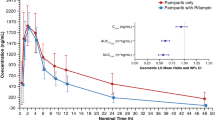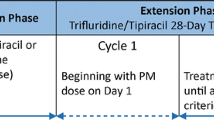Abstract
Purpose
TAS-114 is a first-in-class oral deoxyuridine triphosphatase (dUTPase) inhibitor, which acts as a modulator of the pyrimidine nucleotide metabolic pathway. This was a first-in-human, phase 1 study that investigated the pharmacokinetics (PK) and safety of single-agent TAS-114 when it was given at single and multiple doses.
Methods
For the single-dose cohort (n = 25), healthy male volunteers received a single dose of TAS-114 at 6, 18, 60, 150, and 300 mg. The magnitude of dihydropyrimidine dehydrogenase (DPD) inhibition and the food effect on TAS-114 PK were also investigated. For the multiple-dose cohort (n = 10), subjects received TAS-114 for 14 days consecutively.
Results
In the dose-escalating single-dose cohort, the disposition of TAS-114 followed linear kinetics. The elimination half-life was approximately 2 h. The urine excretion rate and food effect were minimal. A significant increase in uracil Cmax was observed at administered doses of 150 mg or higher of TAS-114, suggesting that significant inhibition of DPD occurred at these doses. No apparent CYP3A4 auto-induction was observed in the multiple-dose cohort. No significant safety concerns at these dose levels were noted after single and multiple dosing.
Conclusions
TAS-114 has shown both a favorable safety and pharmacokinetic profile after single and repeated doses. TAS-114 was considered to possess a moderate DPD inhibitory effect. These findings will facilitate clinical studies of the combination chemotherapies in cancer patients and may reduce the safety risk in the frail cancer patients.


Similar content being viewed by others
References
Heidelberger C, Chaudhuri NK, Danneberg P, Mooren D, Griesbach L, Duschinsky R et al (1957) Fluorinated pyrimidines, a new class of tumor-inhibitory compounds. Nature 179:663–666
Longley DB, Harkin DP, Johnston PG (2003) 5-fluorouracil: mechanisms of action and clinical strategies. Nat Rev Cancer 3:330–338
Aherne GW, Browne S. The role of uracil misincorporation in thymineless death, in anticancer drug development guide: antifolate drugs in cancer therapy. Jackman AL (ed) Humana Press Inc., Totowa, p 409–421
Johnston PG, Fisher ER, Rockette HE, Fisher B, Wolmark N, Drake JC et al (1994) The role of thymidylate synthase expression in prognosis and outcome of adjuvant chemotherapy in patients with rectal cancer. J Clin Oncol 12:2640–2647
Johnston PG, Lenz HJ, Leichman CG, Danenberg KD, Allegra CJ, Danenberg PV et al (1995) Thymidylate synthase gene and protein expression correlate and are associated with response to 5-fluorouracil in human colorectal and gastric tumors. Cancer Res 55:1407–1412
Lenz HJ, Leichman CG, Danenberg KD, Danenberg PV, Groshen S, Cohen H et al (1996) Thymidylate synthase mRNA level in adenocarcinoma of the stomach: a predictor for primary tumor response and overall survival. J Clin Oncol 14:176–182
Peters GJ, van der Wilt CL, van Groeningen CJ, Smid K, Meijer S, Pinedo HM (1994) Thymidylate synthase inhibition after administration of fluorouracil with or without leucovorin in colon cancer patients: implications for treatment with fluorouracil. J Clin Oncol 12:2035–2042
Aschele C, Debernardis D, Casazza S, Antonelli G, Tunesi G, Baldo C et al (1999) Immunohistochemical quantitation of thymidylate synthase expression in colorectal cancer metastases predicts for clinical outcome to fluorouracil-based chemotherapy. J Clin Oncol 17:1760–1770
Ichikawa W, Takahashi T, Suto K, Yamashita T, Nihei Z, Shirota Y et al (2004) Thymidylate synthase predictive power is overcome by irinotecan combination therapy with S-1 for gastric cancer. Br J Cancer 91:1245–1250
Canman CE, Radany EH, Parsels LA, Davis MA, Lawrence TS, Maybaum J (1994) Induction of resistance to fluorodeoxyuridine cytotoxicity and DNA damage in human tumor cells by expression of Escherichia coli deoxyuridinetriphosphatase. Cancer Res 54:2296–2298
Koehler SE, Ladner RD (2004) Small interfering RNA-mediated suppression of dUTPase sensitizes cancer cell lines to thymidylate synthase inhibition. Mol Pharmacol 66:620–626
Ladner RD, Lynch FJ, Groshen S, Xiong YP, Sherrod A, Caradonna SJ et al (2000) dUTP nucleotidohydrolase isoform expression in normal and neoplastic tissues: association with survival and response to 5-fluorouracil in colorectal cancer. Cancer Res 60:3493–3503
Adlard JW, Richman SD, Royston P, Allan JM, Meade A, Parmar M et al (2004). Assessment of multiple markers for association with response rate (RR) and failure-free survival (FFS) in patients with advanced colorectal cancer (CRC) treated with chemotherapy in the MRC CR08 (FOCUS) randomized trial. J Clin Oncol ASCO Annual meeting proceedings (post-meeting edition). Vol 22: Abstract no. 9506
Richman S, Braun MS, Adlard JW, Daly C, Turner F, Barrett J et al (2006) Prognostic value of thymidylate synthase (TS) expression on failure-free survival of fluorouracil-treated metastatic colorectal cancer patients. J Clin Oncol ASCO Annual meeting proceedings part I. Vol 24 (June 20 Supplement): Abstract no. 10011
Nobili S, Napoli C, Landini I, Morganti M, Cianchi F, Valanzano R et al (2011) Identification of potential pharmacogenomic markers of clinical efficacy of 5-fluorouracil in colorectal cancer. Int J Cancer 128:1935–1945
Yano W, Yokogawa T, Fukuoka M, Miyakoshi H, Miyahara S, Ueno H et al (2012) In vitro characterization of a novel dUTPase inhibitor, TAS-114, as a fluoropyrimidine enhancer. Eur J Cancer 48(Suppl 6):22
Yokogawa T, Wakasa T, Yano W, Yoshisue K, Fujioka A, Eshima K et al (2012) TAS-114 enhances S-1 activity in vivo when used in combination. Eur J Cancer 48(Suppl 6):22
Wakasa T, Yamamura K, Tsuji S, Osada A, Matsushima E, Yokogawa T et al (2012) TAS-114 in combination, with capecitabine-based chemotherapy may represent a novel therapeutic strategy. Eur J Cancer 48(Suppl 6):22–23
Jiang H, Lu J, Ji J (2004) Circadian rhythm of dihydrouracil/uracil ratios in biological fluids: a potential biomarker for dihydropyrimidine dehydrogenase levels. Br J Pharmacol 141:616–623
Galteau MM, Shamsa F (2003) Urinary 6β-hydroxycortisol: a validated test for evaluating drug induction or drug inhibition mediated through CYP3A in humans and in animals. Eur J Clin Pharmacol 59:713–733
Yen-Revollo JL, Goldberg RM, McLeod HL (2008) Can inhibiting dihydropyrimidine dehydrogenase limit hand-foot syndrome caused by fluoropyrimidines? Clin Cancer Res 14:8–13
Acknowledgements
The authors thank the subjects who participated in these studies as well as the clinical research associates, coordinators, Yuh Sakata, Hiroshi Ambe, and Takahito Ohkubo for their contributions to the manuscript. Financial support for this study was provided by Taiho Pharmaceutical, Co., Ltd.
Conflict of interest
Kaku Saito, Kazuharu Noguchi, Kunihiro Yoshisue, Tatsushi Yokogawa, Eiji Matsushima, Takeshi Tahara, and Shigeru Takagi have employment in Taiho Pharmaceutical, Co., Ltd. No potential conflicts of interest were disclosed by the other author.
Author information
Authors and Affiliations
Corresponding author
Rights and permissions
About this article
Cite this article
Saito, K., Nagashima, H., Noguchi, K. et al. First-in-human, phase I dose-escalation study of single and multiple doses of a first-in-class enhancer of fluoropyrimidines, a dUTPase inhibitor (TAS-114) in healthy male volunteers. Cancer Chemother Pharmacol 73, 577–583 (2014). https://doi.org/10.1007/s00280-014-2383-2
Received:
Accepted:
Published:
Issue Date:
DOI: https://doi.org/10.1007/s00280-014-2383-2




